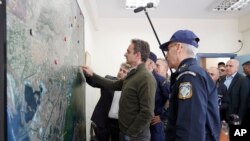Greece has lodged a protest over Turkish troops’ occupation of a small patch of swampland along the land border between the two NATO member nations. Nevertheless, dozens of Turkish soldiers and police remain planted there, defying demands that they retreat. The confrontation is the latest in escalating tension between the two age-old rivals.
For more than 100 miles, the Evros river rips down through Greece’s northeast frontiers, separating the country from Turkey.
About halfway down its course, the waterway swerves in and out of Turkey, creating a plain of small marsh. While officials call the area Melissokomeio, locals like Athanasios Pemousis commonly refer to it as "the horseshoe," because of its shape.
He says the area is usually flooded in winter but it is used by smugglers during the summer to sneak refugees into Greece.
In recent days though, he says, he and others have seen some 35 Turkish soldiers occupying the land, setting up a tent and flying a tiny Turkish flag from a tree.
It may be swampland, he says. But it is Greek territory.
The Foreign Affairs Ministry in Athens has lodged a stiff protest with Ankara demanding the Turkish soldiers pull back from the region. Turkey is refusing to comply, though, and that has Greece’s defense minister, Nikos Panagiotopoulos, extremely concerned.
Rising tensions especially in small areas, he says, heighten the risk of an accident occurring, a spark that could inflame already uneasy ties between Greece and Turkey.
Struggling to revive its devastating tourism industry, Greece has opted to keep the matter quiet, refusing to disclose whether it plans to evict the Turkish soldiers.
While both NATO allies, Greece and Turkey have been at odds with each other for decades, contesting each other's claims to air, land and sea rights.
Twenty-five years ago, the two sides came to the brink of war over competing claims to a barren outcrop inhabited only by goats, rabbits and sheep.
U.S. diplomacy helped pull back both allies from the brink.
Defense experts tell VOA Turkey’s decision to send troops to the region was probably sparked by Greek plans and ongoing technical surveys to extend its border fence with Turkey.
Turkey refuses to acknowledge that some of the land on the eastern side of the Evros river still belongs to Greece.
In recent weeks alone, Greek soldiers have been shot at four times from over the border and Turkish fighter jets are routinely chased out of Greek airspace.
The latest border incident comes weeks after tens of thousands of migrants tried to push their way into Greece from Turkey after President Recep Tayyip Erdogan said in February that he would no longer prevent them from doing so.
He has since then rescinded his decision in order to contain the spread of the COVID-19 pandemic but he has vowed to allow refugees to enter Europe anew once the coronavirus pandemic subsides.
Greece Accuses Turkey of Occupying Small Piece of Greek Land




